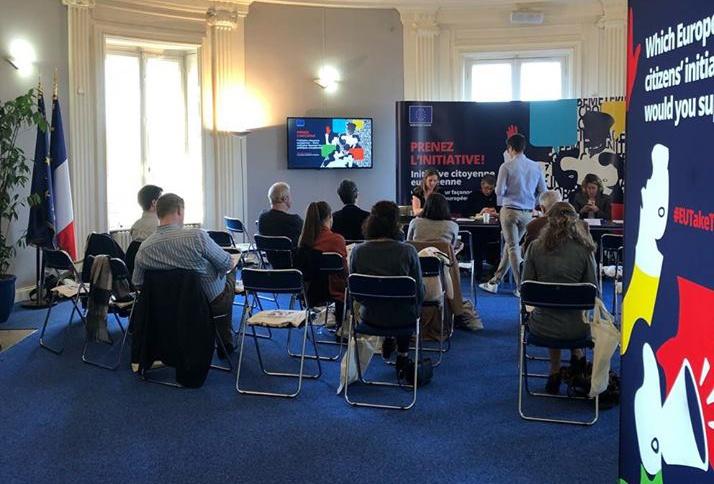
8 November 2018, 13:30-17:30| Representation of the European Commission in France, Paris
The European Citizens’ Initiative carries on its journey across Europe and made a pit stop in Paris for a half-day knowledge sharing workshop on the European Citizens’ Initiative to meet citizens active in the field of participatory democracy. The workshop is part of the European Citizens’ Initiative Roadshow, which aims at raising awareness of the tool amongst EU citizens. The Roadshow has already visited Bulgaria, Lithuania, Poland and the Czech Republic and will stop in Portugal and Austria by the end of 2018.
The team of the European Citizens’ Initiative organised a half-day knowledge sharing workshop gathering representatives of past and ongoing initiatives. It was an opportunity for participants, active in the field of participatory democracy, to meet these representatives and to learn from their experiences with the European Citizens’ Initiative.
The workshop was divided into three parts: a quiz presenting the European Citizens’ Initiative, a panel discussion on the tool and breakout sessions on practical questions related to the European Citizens’ Initiative.
The quiz was carried out by Olga Kurpisz, representative of the European Commission. During the quiz Olga Kurpisz asked questions on key elements of the tool and enabled the participants to test their knowledge of the European Citizens’ Initiative. Olga Kurpisz also highlighted the improvements suggested in the reform of the European Citizens’ Initiative.
« The European Citizens’ Initiative is more than just a petition »
The panel discussion opened by Léopoldine Charbonneaux, Representative of the initiative “End the Cage Age”, spoke about the power that the European Citizens’ Initiative gives to EU citizens. MsCharbonneaux wished to highlight that the European Citizens’ Initiative is far more than just a petition. It creates a real citizen engagement at a national and an EU level.
She then spoke about her experience as the representative of an ongoing citizens’ initiative. She discussed the challenges and obstacles her team and herself are facing in their quest to gather 1 million signatures. The biggest challenge identified is the one of time. Indeed, the organisers have one year to reach the threshold of 1 million signatures. Léopoldine Charbonneaux explained that the organisers have to withstand the whole duration of the campaign and maintain the promotion efforts throughout the whole year. “One must not lose the enthusiasm of the beginning of the campaign”, she said. The solution she suggested is to ensure a good organisation beforehand, which means having identified partners, prepared the communication material, developed a website to collect signatures etc. In order to reach as many people as possible the work must have been laid out.
Another challenge mentioned by Ms Charbonneaux is dealing with the scepticism from potential signatories. Some people are sometimes reluctant to share their personal data, which creates additional challenges for the organisers. The solution is to bring the right arguments to the table, to offer a strong explanation and arguments to convince signatories.
“The European Citizens’ Initiative is an opportunity to put a message forward and to be heard”
Bernard Guille, representative of the “STOP FRAUD and abuse of EU FUNDS” initiative was the next to speak during the panel-discussion. Bernard Guille focused his speech on the challenges related to collecting signatures and the solutions drawn.
One element put forward by him is the legal framework in which an initiative must find its basis. Indeed, it is sometimes difficult to understand and identify the legal basis of an initiative. He explained that for many EU citizens, who do not know the competences of the European Commission and EU law in general it can be difficult to find a legal basis and even whether the Commission has competencies to act in a specific field or not.
Bernard Guille highlighted that it would be interesting and useful to offer European Citizens’ Initiative organisers legal help. Olga Kurpisz added to this point that it is possible to receive legal advice via the Forum of the European Citizens’ Initiative.
Mr Guille also put emphasis on the impact an initiative can have. He explained that what is done at an EU level is not the same as what is done at a local level. The European Citizens’ Initiative enables EU citizens to come together and work to shape European policies, which impact their everyday life at a national level. This tool is “an opportunity to put forward a message and to be heard”. Bernard Guille ended his speech by saying that even if a citizens’ initiative isn’t successful, it enables to launch a movement and get the ball rolling around an idea, which will then follow its own course.
«The European Citizens’ Initiative creates a European synergy »
The panel discussion was concluded by Anne-Marie Perret, representative of the successful initiative “Right2Water”, one of the 4 initiatives having reached the 1 million signature threshold. Ms Perret shared her campaigning experience and explained that it was a long and complicated journey but which could lead to “a real European synergy”. She explained that the tool was a form of ‘militancy’, which requires the involvement of citizens to fight together towards a common goal even if the result isn’t what one was hoping for.
Anne-Marie Perret, explained that to reach one’s goal it was important to be well-prepared, surrounded by professionals who know about politics, law, administrative procedures etc. and that one had to be ready to face external actors capable of influencing the outcome of an initiative, such as lobbies. She shared that during their campaign, they had had to deal with lobbies aiming at weakening their message. To counter this she advises to create strong partnerships with influential organisations, which can carry the organisers through their network and, most importantly, use their tools to multiply the effect of the message.
Getting together to share experiences and knowledge
The panel discussion was followed by three breakout sessions under the title 'European Citizens' Initiative in practice: how to share knowledge about what works?'.
How to raise funds for your campaign? (Moderator: Bernard Guille)
Unfortunately, as the breakout sessions are not allocated, each participant is free to choose whichever topic they prefer, hence this session was not attended by the participants. The moderator of the breakout session and the moderator of the workshop engaged and discussed key issues on the topic.
How to look for partners to support your initiative and campaign? (Moderator : Anne-Marie Perret)
The group identified raising awareness as the main challenge when looking for partners. The key solutions they developed during their discussion were:
- To create a common set of values to be able to reach citizens and consumers (in the case of water here);
- To create a network (not a lobby) bringing together actors of different backgrounds (citizens, charities, NGOs, etc.);
- To create relays with identified partners so that they will take charge of conveying the message of the initiative.
The group then discussed the role of Members of Parliament (MEPs). They explained that organisers must use the influence and the reach of MEPs as well as their support and knowledge but organisers must be careful not to rely too heavily on them. They are not the only important partners that can make a difference.
The group developed the idea that it could be advisable to carry out a market research before launching an initiative in order to test the waters and see whether there is an interest in 7 to 10 countries, facilitating signature collecting. This is almost an economical approach but can be very useful to guarantee a successful initiative. By doing this, organisers can see whether partners would have an interest in promoting the message to their network.
The group agreed that the best approach is not necessarily to aim at the big countries, where the interest might be bigger but where the quotas are much higher. It is recommended to target small countries, which have smaller quotas.
The final idea developed by the group is that partners must be identified at the very beginning of the campaign. The challenge here is to show the committee’s credibility, one way of doing this is showing that the organisers are part of a bigger network (e.g.: a European association, which represents other associations).
How to promote your citizens’ initiative? (Moderator : Léopoldine Charbonneux)
The group here decided to focus on bringing solutions to the question by identifying very practical ways of promoting an initiative, some of which are:
Setting up a newsletter to ensure a better promotion of the initiative at a local level;
- Creating a digital platform, organisers must utilise the digital era we are living in to its fullest;
- Organising awareness-raising events;
- Creating a network of partners;
- Making signatories promoters of the initiative themselves;
- Identifying influencers;
The group then identified the challenges facing the organisers of an initiative. Two main challenges were identified:
- Lasting a whole year:
The main concern here is to be able to maintain promotion efforts for a whole year and not to lose the dynamic of the beginning of the campaign. The main identified solution is to be well-prepared before launching the initiative. The key is to develop a structured and detailed plan for the whole year. If the organisers are well prepared they can withhold the challenge of time. Léopoldine Charbonneaux explained that it is very important to have a good marketing plan, to have developed solid arguments and to be able to bring partners together.
- Reaching a wide range of citizens instead of a niche:
The idea here is to not focus solely on citizens, who already have expressed an interest in the message of the campaign but to reach a wider audience. For this it is important to simplify the message, communicate intelligently with opposing groups, to give the initiative an international dimension.
Another important point mentioned is to build confidence in the initiative. Bring facts, arguments, conversation, debates etc.
The group came up with a three-step concept “Prepare, bring together and build confidence”.
- Categories
- Regulatory framework

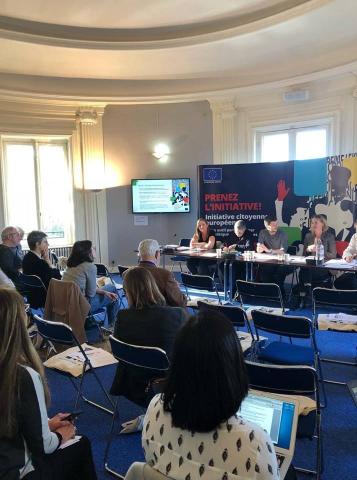
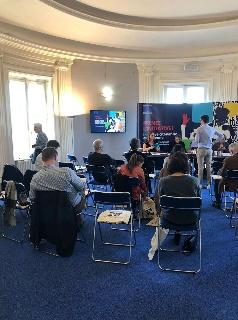
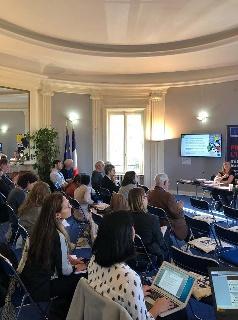
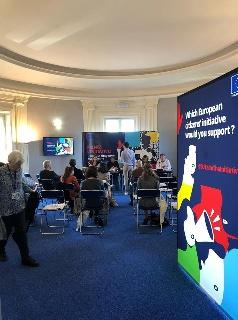
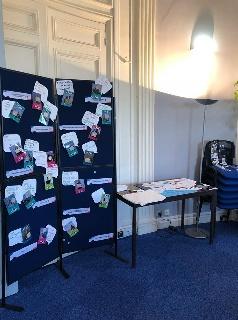

Leave a comment
To be able to add comments, you need to authenticate or register.